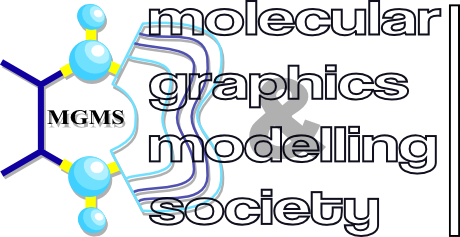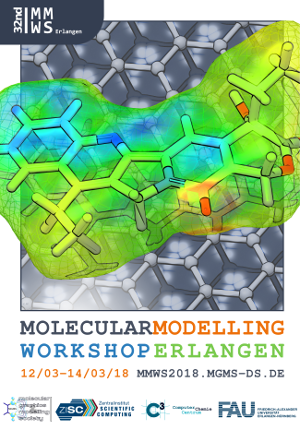Poster Session I
Tuesday, March 13th, 13:30
|
| |
| P01 |
Yannic Alber
(Dortmund, Germany) |
Optimization of Protein-Ligand Binding Affinities Based on Integral Equation theory |
Abstract |
| |
| P02 |
Meriem Almi
(Alger, Algeria) |
Prediction of first-order nonlinear optical properties of Anderson polyoxometalate derivatives |
Abstract |
| |
| P03 |
Hamid A. Lordejani
(Isfahan, Iran) |
New and mild method for the synthesis of alprazolam and diazepam and computational study of binding mode of them to GABAA receptor |
Abstract |
| |
| P04 |
Frank Beierlein
(Erlangen, Germany) |
Spin-Labelled DNA Oligomers: Simulations and Experiment |
Abstract |
| |
| P05 |
Lauritz T. Bußfeld
(Hannover, Germany) |
Towards the coarse-grained modelling of dimethacrylate-based biomaterials |
Abstract |
| |
| P06 |
Ya Chen
(Hamburg, Germany) |
Comparative Analysis of the Chemical Space of Known and Purchasable Natural Products |
Abstract |
| |
| P07 |
Christina de Bruyn Kops
(Hamburg, Germany) |
Generating Structures of Likely Metabolites Based on Predicted Cytochrome P450 Regioselectivity |
Abstract |
| |
| P08 |
Benedikt Diewald
(Erlangen, Germany) |
Study of the Hapten-Binding Properties of Antibody B1-8 Using Steered Molecular Dynamics |
Abstract |
| |
| P09 |
Jonas Dittrich
(Düsseldorf, Germany) |
Converging a knowledge-based scoring function: DrugScore2017 |
Abstract |
| |
| P10 |
Malti Dumbani
(Berlin, Germany) |
Design of Novel Ligands for Thymic Stromal Lymphoetin |
Abstract |
| |
| P11 |
Lukas Eberlein
(Dortmund, Germany) |
pH- and pressure dependent tautomeric and conformational equilibria |
Abstract |
| |
| P12 |
Holger Elsen
(Erlangen, Germany) |
Hydrogen Activationby complex aluminates |
Abstract |
| |
| P13 |
Ningning Fan
(Hamburg, Germany) |
Machine learning models for guiding protein structure selection lead to a boost in the performance of ensemble docking |
Abstract |
| |
| P14 |
Lena Hefke
(Frankfurt, Germany) |
Using Protein Ligand Interaction Fingerprints and Machine Learning tools for the prediction of novel dual active compounds |
Abstract |
| |
| P15 |
Enric Herrero
(Barcelona, Spain) |
From continuum solvation models to hydrophobic descriptors: Application to Three-Dimensional Molecular Overlays with PharmScreen |
Abstract |
| |
| P16 |
Peter W. Hildebrand
(Berlin, Germany) |
Role of structural flexibility for signal transduction by G protein coupled receptors |
Abstract |
| |
| P17 |
Michael C. Hutter
(Saarbrücken, Germany) |
Conservation and Relevance of Pharmacophore Point Types |
Abstract |
| |
| P18 |
Suresh Kumar
(Guwahati, India) |
Storage Capacity of Clathrate Hydrates for Storing Small Molecules |
Abstract |
| |
| P19 |
Amir H. Hakimioun
(Erlangen, Germany) |
Enzyme-Independent Chemical Reactions for Chemistry in Living Cells |
Abstract |
| |
| Please remember to remove your poster afterwards! |
| |
Poster Session II
Wednesday, March 14th, 10:10
|
| |
| P01 |
Julia B. Jasper
(Dortmund, Germany) |
Mapping Binding Site Thermodynamics by 3D RISM Theory for Drug Design |
Abstract |
| |
| P02 |
Jan Joswig
(Berlin, Germany) |
Allosteric Control of pH-Sensitive Ca(II)-Binding in Langerin |
Abstract |
| |
| P03 |
Michael Krug
(Merck, Germany) |
SimDoC - Simulate Dose and Clearance |
Abstract |
| |
| P04 |
Natallia Kulik
(Nové Hrady, Czech Republic) |
Computational modeling of effective inhibitors of topoisomerase IA |
Abstract |
| |
| P05 |
Oliver Lemke
(Berlin, Germany) |
Kinetic models of the Cyclosporines A and E |
Abstract |
| |
| P06 |
Ghulam Mustafa
(Heidelberg, Germany) |
Simulation of Human P450-membrane Interactions |
Abstract |
| |
| P07 |
Sehee Na
(Freiburg, Germany) |
Thermodynamic Integration Network Study of Electron Transfer: from Proteins to Aggregates |
Abstract |
| |
| P08 |
Jasmina Petrova
(Sofia, Bulgaria) |
Study of a multilipid receptor-embedded cell membrane in different ensembles |
Abstract |
| |
| P09 |
Tim Pongratz
(Dortmund, Germany) |
Strategies for developing pressure-dependent force fields |
Abstract |
| |
| P10 |
Nicola Porta
(Düsseldorf, Germany) |
Impact of allosteric inhibitors on MRSA pyruvate kinase conformational dynamics |
Abstract |
| |
| P11 |
Malte Schäfer
(Hannover, Germany) |
Implementing highly selective sorption sites in metal-organic frameworks – a force field study |
Abstract |
| |
| P12 |
Melanie Schneider
(Montpellier, France) |
Improving ligand screening by exploiting structure ensembles and machine learning |
Abstract |
| |
| P13 |
Martin Urban
(Dortmund, Germany) |
Computational structure analysis for membrane-bound potassium channels |
Abstract |
| |
| P14 |
Vishal Nemaysh
(Delhi, India) |
Plausible Involvement of K634 and T681 Mutations in Modulation of Tertiary Structure of Human PDGFR-β Protein Kinase Domain by Computational Molecular Dynamics Analysis |
Abstract |
| |
| P15 |
Birgit J. Waldner
(Innsbruck, Austria) |
Multiscale Simulation and Experimental Characterization of Epoxy/Polyaniline Nanocomposite Coatings – Towards the Rational Design of Nanocomposite Coatings Used in Corrosion Protection |
Abstract |
| |
| P16 |
David Wifling
(Regensburg, Germany) |
Constitutive activity of the human histamine H4 receptor: Computational studies on wild-type and mutant H4R orthologs |
Abstract |
| |
| P17 |
Hilmi Yavuzer
(Bielefeld, Germany) |
Rationalizing the enantioselectivity of aldoxime dehydratases |
Abstract |
| |
| P18 |
Xuejin Zhang
(Boehringer Ingelheim, Germany) |
Novel Chemical Space Driven By Reaction Network |
Abstract |
| |
| P19 |
Ibrahim Maqboul
(Erlangen, Germany) |
Modelling Charge-Transport Pathways in Covalent Organic Frameworks |
Abstract |
| |


